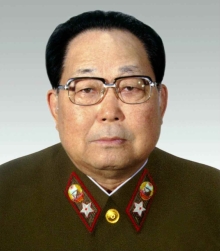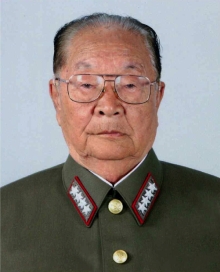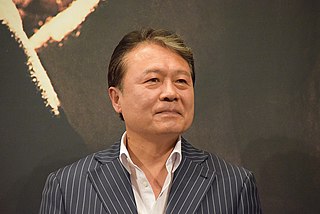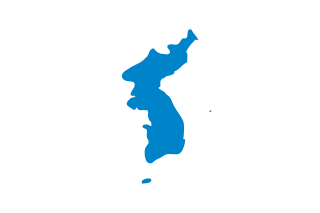External links
- Chun Je-hun – K League stats at kleague.com (in Korean)
| Personal information | |||
|---|---|---|---|
| Full name | Chun Je-Hun (천제훈) | ||
| Date of birth | September 13, 1980 | ||
| Place of birth | South Korea | ||
| Height | 1.76 m (5 ft 9 in) | ||
| Position(s) | Midfielder | ||
| Senior career* | |||
| Years | Team | Apps | (Gls) |
| 2006–2011 | FC Seoul | 4 | (0) |
| *Club domestic league appearances and goals, correct as of 25 July 2011 | |||
Chun Je-Hun (born 13 September 1980) is a South Korean former football player.

Yon Hyong-muk, also spelt Yong Hyong-muk, was a long-serving politician in North Korea and at the height of his career the most powerful person in that country outside the Kim family. He was Prime Minister of North Korea from 1988 to 1992.

Kim Yong-chun was a North Korean soldier and politician. He was a leader of the North Korean military. He held the North Korean military rank Chasu, was Vice Chairman of the National Defense Commission of North Korea, and was Minister of People's Armed Forces. He held a minor post within the Workers Party.

Chun Jung-myung is a South Korean actor. Chun made his break into the entertainment industry in the KBS teen drama School 2 (1999). He is best known for his leading roles in TV dramas such as Fashion 70's (2005), Goodbye Solo (2006), What's Up Fox? (2006), Cinderella's Sister (2010), The Duo, Glory Jane (2011), Reset (2014), Heart to Heart (2015), and Master - God of Noodles (2016).
Parliamentary elections were held in North Korea on 3 August 2003. Representatives were elected for five-year terms to all 687 seats of the Supreme People's Assembly, and also to 26,650 positions in city, county, and provincial People's Assemblies. All candidates were members of the three parties constituting the Democratic Front for the Reunification of the Fatherland.

Parliamentary elections were held in North Korea on 25 August 1948 to elect the members of the 1st Supreme People's Assembly. Organised by the People's Committee of North Korea, the elections saw 572 deputies elected, of which 212 were from North Korea and 360 from South Korea.

Parliamentary elections were held in North Korea on 27 August 1957 to elect members of the 2nd Supreme People's Assembly. Voters were presented with a single list from the Democratic Front for the Reunification of the Fatherland, dominated by the Workers' Party of Korea.

Parliamentary elections were held in North Korea on 8 October 1962 to elect the members of the 3rd Supreme People's Assembly. Only one candidate was presented in each constituency, all of which were selected by the Workers' Party of Korea, although some ran under the banner of other parties or state organisations to give the illusion of democracy. Voter turnout was reported to be 100%, with all reportedly voting in favour of the candidates presented.
Parliamentary elections were held in North Korea on 26 July 1998. 687 deputies were elected to the tenth Supreme People's Assembly. There was only one nominated candidate per constituency - 687 candidates for 687 seats. According to the state news agency KCNA, the turnout rate was 99.85%, and 100% of participating voters cast their ballots in favour of the registered candidates. About two thirds of the deputies were new, and deputies with a military background reportedly doubled in number. Kim Jong-il was unanimously elected in constituency n°666. According to a Rodong Sinmun editorial, this proved "how deep the Korean people's trust in Kim Jong Il is and how powerful and solid the monolithic unity of the people around him in one thought and purpose and with moral obligation is."

Hindsight is a 2011 South Korean action drama film by Lee Hyun-seung, his first after a ten-year hiatus. The film is about a hitwoman who struggles with her feelings for the underworld boss who is her target. The film deals with issues of age difference, and the Korean underworld. It stars Song Kang-ho and Shin Se-kyung, and premiered at the 16th Busan International Film Festival. The film received a total of 763,776 admissions nationwide.

Jon Pyong-ho was a North Korean officer and politician who served as the Chief Secretary of the Korean Workers Party (KWP) Committee of the North Korean Cabinet, and director of the DPRK Cabinet Political Bureau before his retirement in 2010. Jon was described as the 'Chief architect of North Korea's nuclear programme'. Jon was a general of the Korean People's Army and a close adviser to the late Kim Jong-il.
Parliamentary elections were held in North Korea on 9 March 2014 to elect the members of the 13th Supreme People's Assembly.

Chun Ho-jin is a South Korean actor.
The Presbyterian Church in Korea (HapDongYeChong) is a Reformed and Presbyterian denomination in South Korea. Under the leadership of Rev. Chun Byung-Hun, Rev. Choi Young-Su and Lee Sang-Yun the denomination was founded in 1988 at Seoul YeChin Church. In 2004 there was 32,178 members in 65 congregations served by 70 ordained ministers the church had 7 Presbyteries and a General assembly. It subscribes the Apostles Creed and Westminster Confession.
Chun Doo-hwan was a South Korean army general and military dictator who ruled as an unelected strongman from 1979 to 1980 before replacing Choi Kyu-hah as president of South Korea from 1980 to 1988.

The 10th Supreme People's Assembly of North Korea was in session from 1998 until 2003. It consisted of 687 deputies, and held six sessions.

The Inter-Korean Liaison Office was a joint liaison office of North Korea and South Korea located in North Korea's Kaesong Industrial Region.

Parliamentary elections were held in North Korea on 10 March 2019 to elect the members of the 14th Supreme People's Assembly. The elections were announced on 6 January 2019. With only one candidate on the ballot in each constituency, outside observers described it as a show election. 687 candidates for the DPRK deputies to the SPA were elected. Kim Jong Un did not stand for election, marking the first time that a North Korean leader did not participate as a candidate.

Our Blues is a 2022 South Korean television series starring Lee Byung-hun, Shin Min-a, Cha Seung-won, Lee Jung-eun, Uhm Jung-hwa, Han Ji-min, and Kim Woo-bin. The series revolves around the sweet and bitter lives of people at the end, climax, or beginning of life, and depicts their stories in an omnibus format against the backdrop of Jeju Island. It premiered on tvN on April 9, 2022, and aired every Saturday and Sunday at 21:10 (KST) with 20 episodes. It is available for streaming on Netflix in selected regions. It is also one of the highest-rated dramas in Korean cable television history.